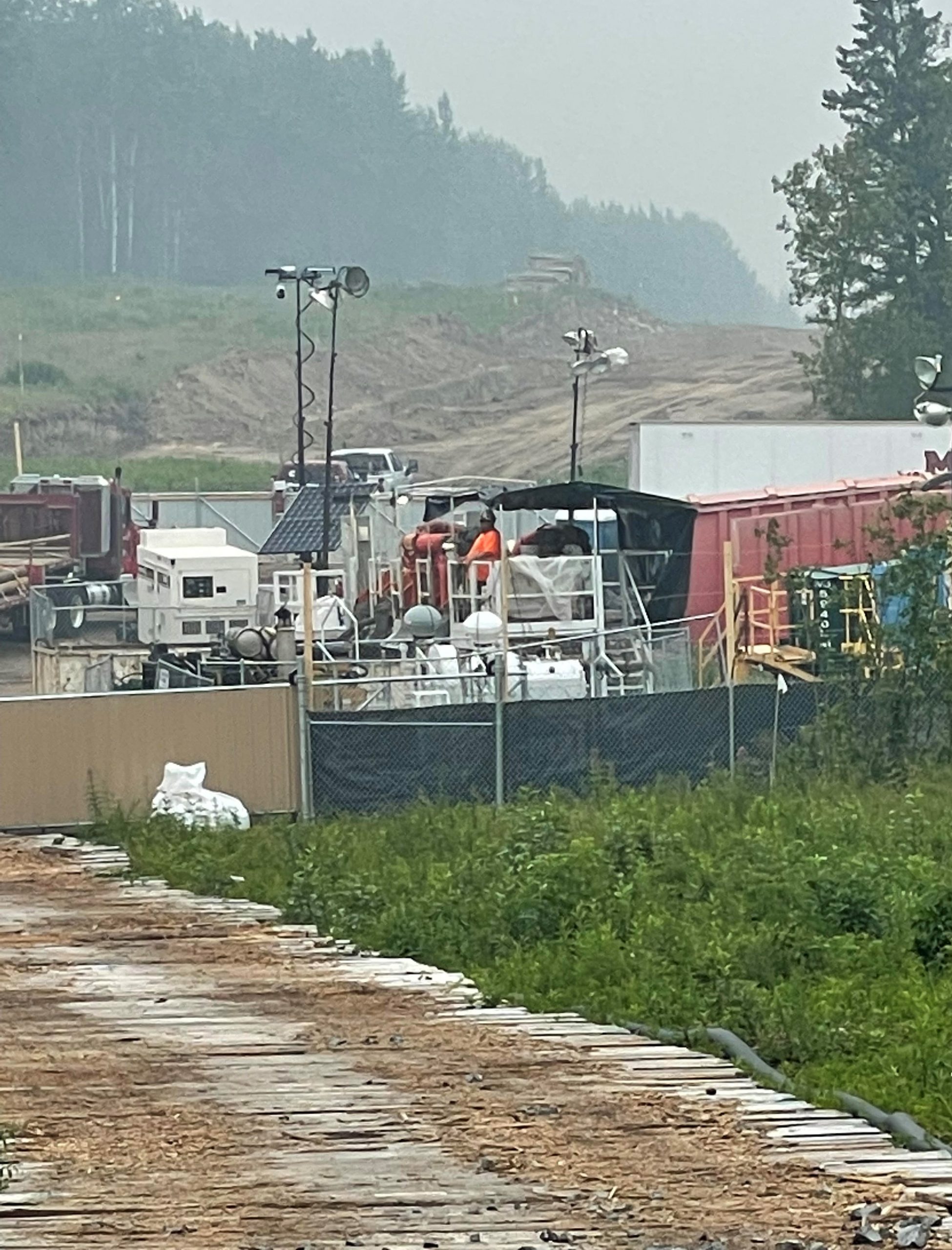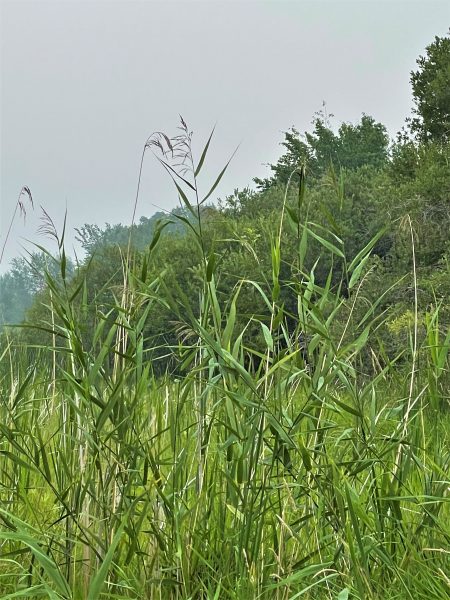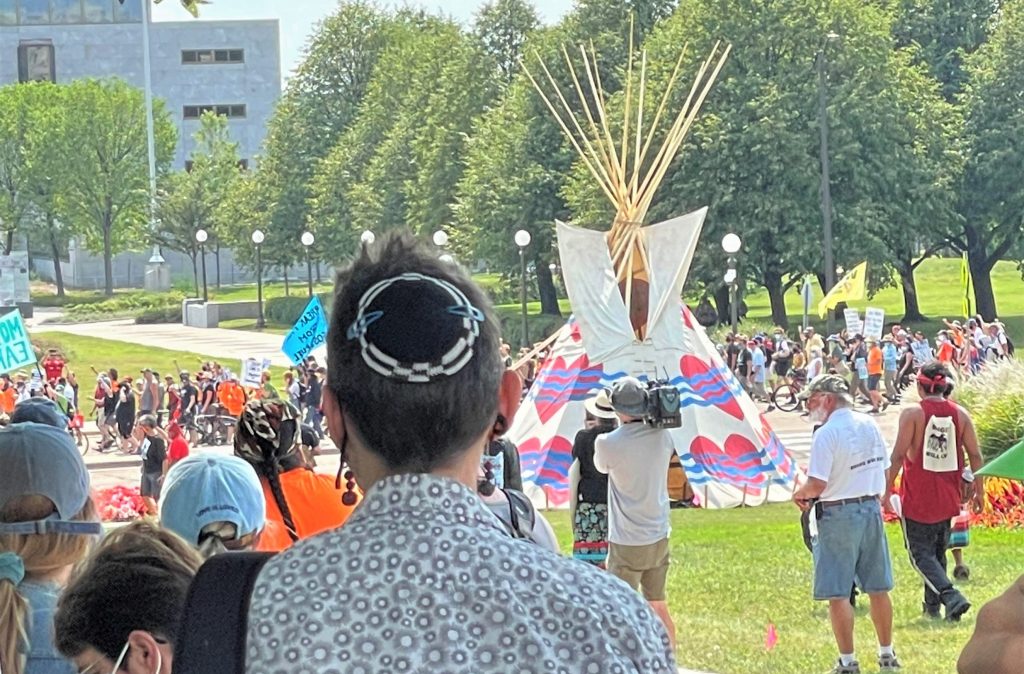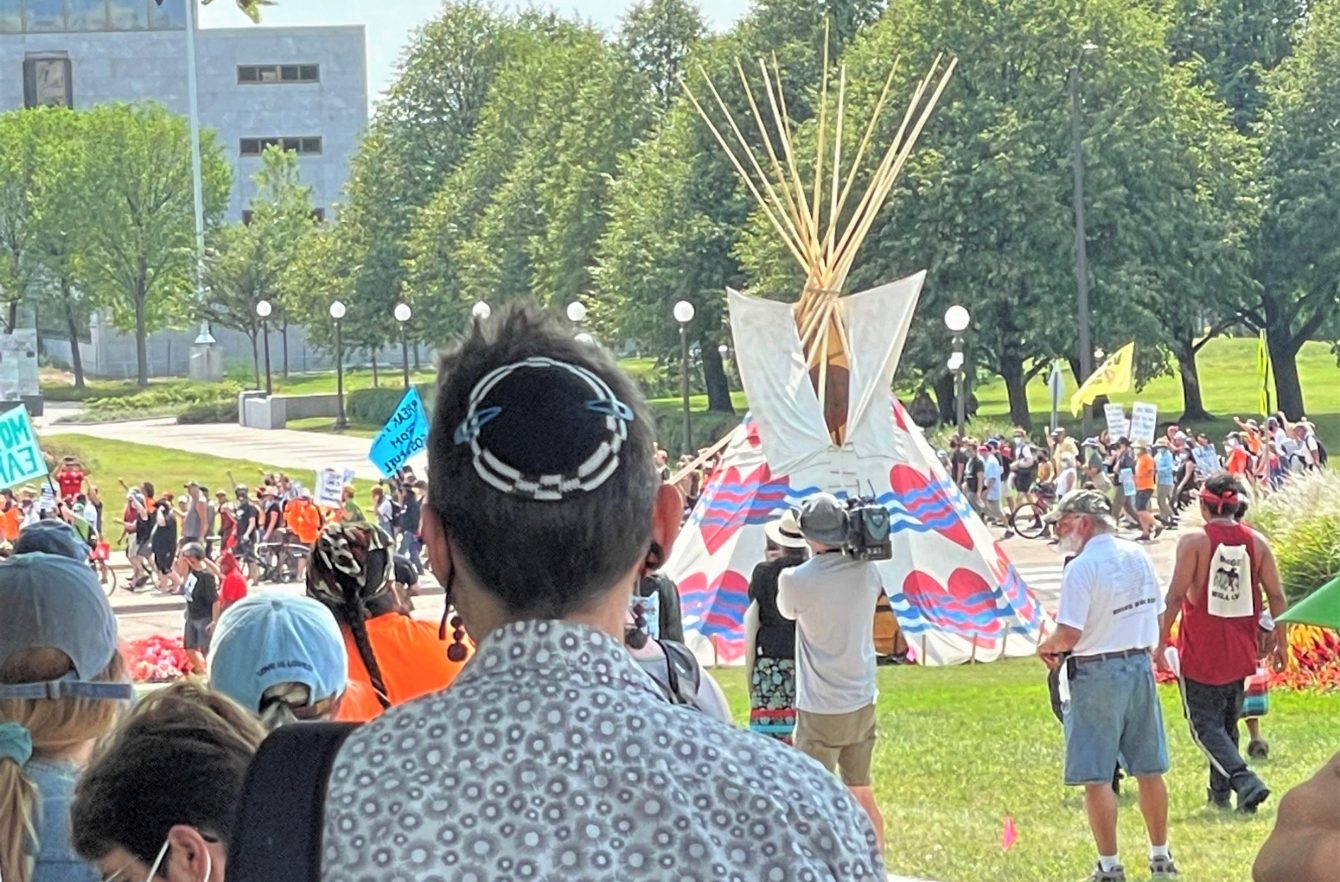Table of Contents
There are many obvious connections between fossil fuel pipelines and agriculture. Fossil fuels are used to power farm machinery and are used in the manufacturing of pesticides and synthetic nitrogen fertilizers. And the climate changes caused by fossil fuel greenhouse gases are making it harder to farm by causing weather extremes like droughts, floods and excessive heat and allowing pests to expand their ranges.
But I would like to address other connections which also point to the need for different communities that may not often interact to recognize and act together on fundamental issues underlying fossil fuels, industrial agriculture and other parts of society that are common to all of us. The historical and largely white incrementalist environmental movement, including its agricultural manifestations, has failed to adequately protect the environment, let alone the rights and wellbeing of BIPOC communities. Only an intersectional movement that embraces and supports leadership from BIPOC communities most affected, and in the service of fundamental political and democratic economic change, will successfully address these issues.
The fight against the Enbridge tar sands Line 3 oil pipeline is an important example of the need for intersectional and intercommunity solidarity and work: I urge support for that fight and suggest some entry points for helping (see the end of the article for useful links). Hopefully as we continue to recognize the commonalities that underlie all of our issues, we will achieve more mutual support for fundamental social change.
Why We Must Stop Line 3
As background, in northern Minnesota, the Canadian company Enbridge is building most of its U.S. section of a tar sands oil pipeline, approved by state regulators and greenlighted by the state’s democratic governor Tim Walz. This is despite its threat to some of the most unpolluted waters and wetlands in the country at the headwaters of the Mississippi River, and its abrogation of Native American treaty rights. Louise Erdrich, acclaimed author, Minnesota resident, and member of the Turtle Mountain Band of Chippewa noted ways tar sands oil development is harming our land, water, climate and Indigenous rights and called Line 3 a “breathtaking betrayal”. The source of this oil, in Alberta Canada, has been called the most destructive in the world and its extraction is similarly steamrolling First Nation opposition in Canada. The toxic tailing ponds alone could fill more than 500,000 Olympic-sized swimming pools. In addition, the pipeline doubles the current capacity of the existing aging pipeline and would produce the equivalent carbon dioxide of about 50 coal fired power plants. It takes a new route that goes through hundreds of streams and wetlands, including crossing the Mississippi River twice at its headwaters.

Enbridge has a dismal history of damaging leaks. An Enbridge leak into a tributary of the Kalamazoo River in Michigan in 2010 released about a million gallons of the particularly nasty tar sands oil. It caused huge damage that had not been entirely remediated years later and cost at least $1.2 billion and years of lost river use. Because it is heavy and sinks, it is particularly hard to remediate. In Minnesota, Enbridge pipelines have had numerous leaks over the past 30 years including one of 1.7 million gallons. These are the largest inland oil leaks in U.S. history. Despite this, our current laws or regulatory agencies have been grossly inadequate in ignoring this damning history. During drilling under streams and rivers there have already been numerous leaks during Line 3 construction, called frac outs, with potentially toxic drilling fluid contaminating the water.
The new pipeline would also expand and lock in production of the dirtiest oil in the world, possibly for decades, during which time we must eliminate fossil fuel use. The new IPCC report, massive wildfires, huge storms, heat domes and droughts all point to the urgency of ending the use of fossil fuels and the insanity of building Line 3. And yet the Minnesota government and the Biden Administration is letting this pipeline proceed, the latter despite laudably stopping the Keystone XL pipeline and although Enbridge Line 3 would be almost as large. Walz’s own Department of Commerce opposed the pipeline because it did not meet regulatory requirements for economic benefits for the State or long-term demand for the oil. Recently the International Energy Agency research showed that a path to zero human carbon emissions, could likely only be achieved by ceasing all new fossil fuel project development and that oil demand growth would end over the coming decade.
More recently, in the midst of a extreme drought forcing water use restrictions on citizens, Enbridge asked for a 10-fold increase in its permitted “dewatering,”—from the previous 500 million to 5 billion gallons. Without requiring any significant new data, and based on assumptions, the State’s feckless Department of Natural Resources approved the new allocation. Under pressure from scientists laying out how this may harm the environment and violate agency protocols and treaty rights (scroll to July 20, 9:02 AM), the DNR pulled that back a bit by restricting withdrawal from some waterways but leaving in place the overall increased allocation.
With Line 3, there is also a more direct connection with food. The pipeline route goes through historic treaty lands and violates treaty rights. These lands contain some of the most important wild rice, manoomin in Anishinaabemowin, areas in the world. Manoomin is an amazing plant that grows in the shallows of northern lakes in very clean water. It is a central part of Ojibwe/Anishinaabe people’s way of life. But manoomin is very susceptible to pollution or changing water levels, and oil leaks could be catastrophic. It is also very vulnerable to the climate change that Line 3 would accelerate.

Despite rhetoric from the governor and national political leaders about respecting Indigenous rights, native water protectors have mostly been ignored at the State and Federal levels and arrested along with their allies when asserting their rights. Instead of putting a hold on the pipeline during lawsuits challenging its legality, governments have given it a greenlight. And Enbridge has financially supported local law enforcement through an escrow account to deter peaceful protestors. They have routinely blockaded public land and roads or land belonging to water protectors. Most recently police action has resulted in the use of rubber bullets and tear gas and denying medication to arrested water protectors.
The Commonality of Indigenous Values and Our Fundamental Rights
This parallels similar actions against largely peaceful protestors in Minnesota (and elsewhere) against the brutal murder of George Floyd and other black citizens, and the use of the police against the fundamental rights of peaceful assembly on behalf of a healthy planet.
As predicted, construction of the pipeline has been accompanied by increased abuse of women. The tragic epidemic of murdered and missing indigenous women was predicted to increase with the “man camps” that include an influx of non-local people to work on construction. Several Enbridge employees have already been arrested in multiple sex trafficking sting operations.
Instead of harassing and arresting Native American water protectors, we should be listening to them and following their lead. Research has repeatedly shown that Indigenous peoples, including their traditional food ways, protect the ecosystems they have lived in and respected for millennia. Yet despite rhetoric to the contrary, our governments continue to disrespect and harm these communities and ignore their leadership in protecting the environment we all depend on. Similarly, the value of indigenous relationship and respect for the environment is also seen in the wisdom and productivity of indigenous and small and medium sized farms which protect biodiversity and feed most of the world.
Contrary to both Governor Walz and President Biden’s touted fidelity to science, allowing major new oil pipelines like Line 3 and others flies in the face of the existential urgency overwhelmingly documented by climate science as the new IPCC report amplifies dramatically.
The misuse of science is a common theme of both the fossil fuel industry and industrial agriculture. Government and industry have selectively used agricultural science to justify support of purchased-input-heavy industrial ag and more recently approaches such as climate smart agriculture that supposedly address industrial agriculture’s many failings but are actually an extension of the failed industrial system. While possibly incorporating some ecologically sound practices, and yet continuing with other harmful practices, these approaches do not fundamentally address the biodiversity, climate or social and power inequities of industrial agriculture.
The Same System Controls Energy and Agriculture
Underlying both the continuing push for fossil fuel development and industrial agriculture, and the devaluing of indigenous and ecological science, is the undiminished pressure to reduce costs and maximize corporate profits. Fuel and chemical corporations favor externalizing costs at the expense of the environment and society while favoring the “solutions” of corporate ag companies rather than small to medium sized farms, as we saw with the attempted corporate takeover of the UN’s food summit (see also here). This is despite abundant science that supports the food, environment, and social justice value of agroecology and food sovereignty.
In the end, and fundamentally, the colonial and extractive political economy that subsidizes and facilitates fossil fuels like the Canadian tar sands oil is the same system that subsidizes industrial agriculture. It too is extractive, props up colonization by corporations, subsidized exports, inputs of pesticides, fertilizers and GMOs that are harming biological diversity and small farms and communities.
When we take a step back, we see in northern Minnesota a microcosm of extractive capitalism’s assault on the ecosystems we all need to survive and live full lives. Not only the Line 3 pipeline, but also the proposed copper-nickel mines that share Enbridge’s lousy environmental and environmental justice track records threaten the water of the area. And over the past few decades industrial agriculture has ploughed several hundred thousand acres of previously uncultivated land in northern and central Minnesota. Many of these changes are encroaching on historic Indigenous treaty lands and ignoring those treaty rights.
The commonalities of extractive businesses, be they energy or agriculture, are numerous when seen through the lens of social and environmental justice. And, broadly, so are many of the solutions. As we need a new renewable and distributed energy and energy conservation infrastructure to be supported by Federal and State policies, we also need policy support for a racially equitable agriculture parity program, supply control, reparations, and financial support for the environmental and cultural values of agroecology and food sovereignty. We need strong anti-trust laws and enforcement not only for agricultural sector companies like JBS, Tysons, Cargill (headquartered in Minnesota) Bayer/Monsanto and food retailers like Walmart, but also energy giants, giant financial institutions, gig economy and internet giants and others as well. We need social rather than private enterprises based on “just in time” economies that have failed to fight the pandemics that have disproportionately harmed BIPOC communities and the poor. Environmental justice issues of toxic exposure from the selective siting of harmful industries in urban BIPOC communities such as incinerators, highways, and oil refineries mirror abuse of essential farm and food workers, historic land theft and policy discrimination against BIPOC people, and exposure to pesticides and pollution from CAFOs that are often selectively sited in communities of color. All are symptoms of an underlying extractive settler-colonial capitalism that exploits both the environment and people, especially people of color and the poor.
Recognizing, affirming, and challenging the current system as fundamentally bankrupt contrasts with the common issue-by-issue approach from within the current system. Those supporting these incrementalistic and siloed approaches as the primary way to address environmental and environmental justice and social issues, often in league with the private sector in so-called public-private partnerships, argue that their approach achieves progressive and cumulative positive change over time. But their record over the past five or six decades contradicts this. In agriculture, efforts like the Roundtable for Responsible Soybeans amount to greenwashing efforts that have failed people and the environment.
The question we must ask is “how do we work together better to achieve fundamental change?”
Beyond our individual struggles and the many siloed issue-by-issue campaigns, it is crucial to support others in our communities working for fundamental change for social and environmental justice. This means showing up with material support, listening to local and BIPOC communities and ceding still-entrenched white leadership and power while being good allies. This is not easy given understandable and justified historic mistrust and white fragility, and barriers even between different BIPOC communities.

It requires understanding that the system that has brought us climate change, a global biodiversity crisis and was built on slavery and the dispossessive accumulation of settler colonialism that are threatening human survival, is still the problem. Relying on this system to make the huge changes necessary is therefore a fool’s errand. That does not mean that remediative and incremental efforts at damage control under the current political economy provide no benefits. They can make some real differences in people's lives.
But there is a difference between recognizing work on specific issues as a way to protect specific people or some narrow environmental threats and expecting this approach to solve broader social or environmental issues. Planting pollinator-friendly plants along roadsides or on one’s property does not address the tireless destructive current of our political economy where the industrial ag landscape that is orders of magnitude bigger is destroying biodiversity. These and similar efforts may be helpful, but are not sufficient. And depending how they are framed, these approaches may give the illusion of general progress, distract from needed change and divert resources.
They do not address a system that is fundamentally destructive of ecological or cultural complexity. This failing underlies all the social mechanisms from the carceral state to industrial agriculture and the corporate fossil fuel energy system. Ultimately, in addition to protecting nature for its intrinsic value and rights, all aspects of society or social and economic structure are justifiable only to the extent that they provide social and personal wellbeing to the whole population.
For all of these reasons, we must see the common cause behind our individual movements, especially for mostly white organizations and efforts. Incrementalism won’t do this because it usually sees specific problems and issues as aberrations rather than having deeper connections. And where incrementalism is occasionally targeted at deeper connections, it often neglects that even incremental changes are often, if not usually, the result of simultaneous pressure from the broader community to address root problems. We must not self-censor by asking only for what we think we can get: we must demand what we know is needed for all communities.
But incrementalism, because it does not act on what connects our individual causes, also cannot take advantage of broad collective vision and effort. And unless we make the effort to reach out, build trust, and work together for common cause, our separate and divided causes have much less chance of success. This is not easy and requires patience and persistence and relinquishing considerable power and resources by current entrenched white leadership, not just rhetoric. And given that many organizations are already stretched and feel inadequate tackling their current issues, it may be hard to accept devoting some of those resources consistently and for the long haul to building strong networks and supporting the issues of others. This also means greater amounts of resources going to previously and currently undersupported BIPOC groups. Without these efforts, I fear that we will not achieve what we need to do.
Take Action
For those who can help in the fight against Line 3, here are links to several organizations and movements led by Indigenous leaders:
- Honor the Earth;
- The GINIW Collective;
- Stop the Money Pipeline;
- The Indigenous Environmental Network;
- RISE Coalition
Update: Minnesota Public Radio reported on September 29, 2021, that Enbridge has said that Line 3 has been completed and will begin pumping oil on October 1. However, as of October 5, the pipeline has not been reported to be delivering oil at the Wisconsin terminal. In any case, resistance, as with the already-functioning Dakota Access Pipeline (DAPL), will continue and support is still very much needed. Continuing to make this and other pipelines more expensive through resistance, and ultimately shutting operation, makes continuing fossil fuel development less viable and supports and provides solidarity to indigenous water protectors.
Photo Credits:
1) Banner photo: Peaceful protest led by indigenous water protectors at the Minnesota State Capitol on August 25. One of numerous protests in the Twin Cities, at the pipeline construction site, and elsewhere in the state. Photo credit D. Gurian-Sherman
2) Enbridge Line 3 oil pipeline construction at the Mississippi River headwaters in northern Minnesota in July. Photo credit D. Gurian-Sherman
3) Line 3 pipeline construction crossing the Mississippi River headwaters in northern Minnesota in July. Part of over 330 miles of construction in the state. The haze is from forest fires nearby in Canada exacerbated by climate change which Line 3 would contribute to. Photo credit D. Gurian-Sherman
4) Manoomin, also called wild rice, growing in Upper Rice Lake near Line 3 pipeline construction. It is threatened by pollution from pipeline leaks and climate change. Photo credit D. Gurian-Sherman

